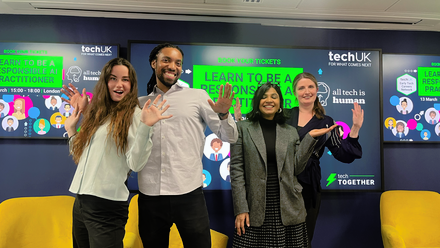Revolutionising Industries: AI's Impact on Innovation
This insight provides a glimpse into various membership use cases in the realm of AI Innovation, showcasing innovative applications across different sectors. Released on 09/05/2024, it highlights how organisations leverage artificial intelligence to address critical challenges and advance their respective fields.
Each use case demonstrates the transformative power of AI in tackling complex issues while prioritising privacy, efficiency, and improved outcomes. If you're interested in contributing a use case, please reach out to [email protected].
(NPL) Supercharging the UK’s effective use of data and AI
Problem: To unlock and extract the maximum value from data and AI we need to have confidence. Confidence in the quality of the data and confidence in how trustworthy, robust, safe or risky the outputs of AI tools, technologies and systems are. As the world transforms around us, we need to transform with it, and indeed stay ahead of it.
Solution: To ensure that industry, regulators, civil society and academic researchers have the tools and knowledge to contribute to the development of such standards and make informed use of published standards to advance trustworthy and responsible AI, the AI Standards Hub was established.
Alan Turing Institute in partnership with the British Standards Institution (BSI), the National Physical Laboratory (NPL), DSIT and the Office for AI, which is addressing the challenges faced by stakeholders in navigating the evolving landscape of AI standardisation and aims to increase the country’s contribution to the development of international standards for AI.
_______________________________________________________________________________________
(Verne) Sustainable AI and the path to Innovation
Problem: AI itself demands a huge amount of computing power – and therefore has a negative impact on the environment itself through carbon emissions. This is especially true of generative AI. The compute power used to train ChatGPT, for example, equates to enough electricity to power thousands of homes for a year, and the costs for electricity alone to train the next generation models are estimated to reach $400 million per year or more.
Solution: To tackle AI’s carbon problem, organisations investing in this technology need to think carefully about where they house the high intensity compute required. Location is key to the solution. Only about 10% of applications are truly latency-sensitive and therefore need to be located near to the end-user, often in highly-connected, but energy inefficient metro locations, like London.
Iceland is a great example, as the only country in the world with 100% of its electricity powered by renewable (hydroelectric and geothermal) energy. What’s more, the temperate climate of Iceland and other Nordic countries means that data centres in these locations benefit from free air cooling. Many data centres are also investing in sustainable solutions – such as alternative cooling methods like liquid cooling technologies – to boost their energy efficiency and reduce their environmental impact. If data centres and businesses continue to prioritise these solutions and invest in green data centre solutions, the environmental impact of compute-intensive technologies like AI will be greatly reduced.
________________________________________________________________________________
(Innovative Physics) Understanding is key to accepting the benefits of AI
Problem: The challenge for Britain is to overcome a growing general negative attitude to AI and for the public and various sectors to embrace it as something that will bring benefits across the board.
Solution: Pattern recognition leads us to better design and speeds up knowledge acquisition of how things work. Data can be processed more quickly using pattern recognition and Intelligent analytics leads to a tactical advantage. “AI can help people use data gathered in IA to make important tactical decisions and then move onto predictive capability and strategic advantage.”
If a radiographer is to make a safe, informed decision about what they are seeing on a scan then that could typically take 35-40 minutes. With intelligent analytics, that time could come down to 3-4 minutes, and be used to help the radiographer’s decision process – thus supporting the process not replacing it. Another result is using AI tools to control the temperatures in your home as a good example of what using AI for the means for good rather than evil, in that it will control the user’s bills and ultimately be a step towards limiting global warming.
________________________________________________________________________________
If you found this case study document on AI Innovation interesting and want to learn more about techUK’s work in AI Safety, please email [email protected].

Tess Buckley
Tess is a digital ethicist and musician. After completing a MA in AI and Philosophy, with a focus on ableism in biotechnologies, she worked as an AI Ethics Analyst with a dataset on corporate digital responsibility (paid for by investors that wanted to understand their portfolio risks). Tess then supported the development of a specialised model for sustainability disclosure requests. Currently, at techUK, her north star as programme manager in digital ethics and AI safety is demystifying, and operationalising ethics through assurance mechanisms and standards. Outside of Tess's work, her primary research interests are in AI music systems, AI fluency and tech by/for differently abled folks.

Laura Foster
Laura is techUK’s Associate Director for Technology and Innovation.







